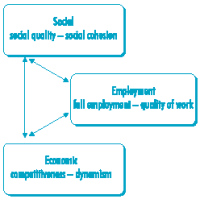WHAT ABOUT THE EUROPEAN UNION SOCIAL POLICY?
Aim of the EU Social Policy
Social Policy as a separate policy area is new to the European Union. It was included in Amsterdam treaty in October 1997, after some lobbying from, among others, Scandinavian countries. The motivation was to a great extent to avoid "social dumping", meaning not allowing poor social conditions being used as a competitive advantage in the EU by lower social costs.
 The Commission on Employment and Social Affairs, headed by the Greek Commissioner Ms Anna Diamantopoulou, sees Social Policy as a productive factor, where economic, social and employment policies are mutually re-enforcing. The Commission on Employment and Social Affairs, headed by the Greek Commissioner Ms Anna Diamantopoulou, sees Social Policy as a productive factor, where economic, social and employment policies are mutually re-enforcing.
The policy is built on one of the fundamental objectives of the European Union, which is increasing living standards. Social policy is seen as a productive factor in that process. Full employment, better jobs, new work environment, knowledge-base economy and mobility will lead to a better competitive position of Europe. Social protection, social inclusion, gender equality, no discrimination and social dialogue increase productivity and efficiency.
Much social expenditure, like health and education – is seen as an investment in human resources. Much effort is laid on quality of employment, social spending and industrial relations in order to increase the competitive power of Europe.
DG Employment & Social Affairs is responsible for the development and monitoring of the European Employment Strategy, which encourages co-operation between Member States on their employment policies, and mainstreaming of employment in all Community policies.
Other tasks are effective implementation and developments of labour standards, like health and safety, working time etc, and free movement of workers. Promoting equality between women and men and the development of the new antidiscrimination policies related to employment are also within the scope of DG Employment & Social Affairs.
The old, traditional fields of EU policy, like agriculture or regional policy, are burdened by old ways of thinking, which is deeply rooted and thus very difficult to change. The social sector has more vital and progressive attitude, ready to reform the EU to a competitive power in the world. The directorate also gives the impression of being much more development oriented than some of the old "traditional" directorates.
Where does the money go
 DG Employment & Social Affairs also manages the European Social Fund, ESF. It is the main European financial tool for the employment strategy and contributes to social and economic cohesion. It has invested in programmes to develop people's skills and their potential for work. 195 billion EURO is allocated for 2000-2006. DG Employment & Social Affairs also manages the European Social Fund, ESF. It is the main European financial tool for the employment strategy and contributes to social and economic cohesion. It has invested in programmes to develop people's skills and their potential for work. 195 billion EURO is allocated for 2000-2006.
ESF channels its support into strategic long-term programmes that help regions across Europe, particularly those lagging behind, to upgrade and modernise workforce skills and to foster entrepreneurial initiative. The money is managed by the national governments in respective EU countries.
Involvement in EU enlargement
DG Employment & Social Affairs heavily involved in the enlargement process. Of the 105 million inhabitants of the candidate countries, more than 98 million will live in regions with a GDP per head less than 75% of the average in EU27.
However, the financial allocation for structural measures decided by the Berlin European Council, including funding for the new Member States, will amount to only 0.45% of the GDP of an enlarged Union of 21 in 2006.
DG Employment & Social Affairs are active in the applicant countries in a number of ways, for example monitoring implementation of legislation adapted to EU. There is also an ongoing assessment of the employment conditions in cooperation with the governments in the applicant countries
The role of cities
As usual, sub-national authorities, like cities, are very little engaged either in a dialogue with DG Employment & Social Affairs or with the national governments. Cities will in due time to a great extent be responsible for implementation of the accession to EU – the social sector is one of the large items in city budgets. But it is very unclear what the EU enlargement will mean for the cities both in terms of money and in terms of future responsibilities.
However, "traditional" social issues that engage cities and local authorities, for example care and social security, are not in the core of the activities of the DG Employment & Social Affairs. But the social engagement of cities is changing as well. Hopefully the UBC General Conference will open some doors for a dialogue between the local authority level and the European Union.
Juhan Janusson
UBC EU Co-ordinator
|